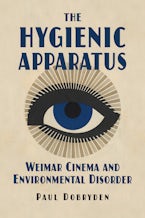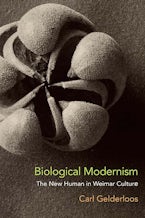LITERARY CRITICISM / European / German
Showing results 1-10 of 59
Filter Results OPEN +

Genre, Race, and the Production of Subjectivity in German Romanticism
Exposes German Romanticism’s entanglements of aesthetic philosophy with racialized models of humanity
The Aesthetics of Mythmaking in German Postwar Culture
Myths are a central part of our reality. But merely debunking them lets us forget why they are created in the first place and why we need them. André Fischer draws on key examples from German postwar...
The Hygienic Apparatus
The Hygienic Apparatus traces how the environmental effects of industrialization reverberated through the cinema of Germany's Weimar Republic. The book analyzes classic films, documentaries, cinema architecture, and studio practices.
Literary Conclusions
Analyzing works by Gotthold Ephraim Lessing, Johann Wolfgang von Goethe, and Heinrich von Kleist, Oliver Simons shows how the emergence of new kinds of literary endings around 1800 is inextricably linked to the history of philosophical and scientific concepts.
At the Limit of the Obscene
At the Limit of the Obscene: German Realism and the Disgrace of Matter examines the fear of materiality in German‑language realist and postrealist literature.
The Saving Line
This book reconstructs a wide-ranging dialogue between Walter Benjamin’s major essay on Goethe’s Elective Affinities and Theodor Adorno’s meditation on the Odyssey in Dialectic of Enlightenment. Dornbach leverages the concept of caesura to identify utopian moments in a variety of works.
Karl Kraus and the Discourse of Modernity
Karl Kraus and the Discourse of Modernity reads the literary works of the Viennese satirist, journalist, and playwright Karl Kraus (1874–1936) alongside Søren Kierkegaard, Walter Benjamin, and Theodor Adorno.
Biological Modernism
Biological Modernism details how German writers during the Weimar Republic drew on discourses and tropes from the biological sciences to redefine the human being for a modern, technological age.
Eardrums
Eardrums contributes to contemporary discussions surrounding the historicity of listening and acoustical knowledge by examining a pivotal moment in the evolution of the ear and listening in German modernist literature and cultural production.
Sex Changes with Kleist
Sex Changes with Kleist shows that Heinrich von Kleist responded in a unique way to a change in the conception of sex and gender that occurred in the late eighteenth century.

Genre, Race, and the Production of Subjectivity in German Romanticism
Exposes German Romanticism’s entanglements of aesthetic philosophy with racialized models of humanity
The Aesthetics of Mythmaking in German Postwar Culture
Myths are a central part of our reality. But merely debunking them lets us forget why they are created in the first place and why we need them. André Fischer draws on key examples from German postwar...
The Hygienic Apparatus
The Hygienic Apparatus traces how the environmental effects of industrialization reverberated through the cinema of Germany's Weimar Republic. The book analyzes classic films, documentaries, cinema architecture, and studio practices.
Literary Conclusions
Analyzing works by Gotthold Ephraim Lessing, Johann Wolfgang von Goethe, and Heinrich von Kleist, Oliver Simons shows how the emergence of new kinds of literary endings around 1800 is inextricably linked to the history of philosophical and scientific concepts.
At the Limit of the Obscene
At the Limit of the Obscene: German Realism and the Disgrace of Matter examines the fear of materiality in German‑language realist and postrealist literature.
The Saving Line
This book reconstructs a wide-ranging dialogue between Walter Benjamin’s major essay on Goethe’s Elective Affinities and Theodor Adorno’s meditation on the Odyssey in Dialectic of Enlightenment. Dornbach leverages the concept of caesura to identify utopian moments in a variety of works.
Karl Kraus and the Discourse of Modernity
Karl Kraus and the Discourse of Modernity reads the literary works of the Viennese satirist, journalist, and playwright Karl Kraus (1874–1936) alongside Søren Kierkegaard, Walter Benjamin, and Theodor Adorno.
Biological Modernism
Biological Modernism details how German writers during the Weimar Republic drew on discourses and tropes from the biological sciences to redefine the human being for a modern, technological age.
Eardrums
Eardrums contributes to contemporary discussions surrounding the historicity of listening and acoustical knowledge by examining a pivotal moment in the evolution of the ear and listening in German modernist literature and cultural production.
Sex Changes with Kleist
Sex Changes with Kleist shows that Heinrich von Kleist responded in a unique way to a change in the conception of sex and gender that occurred in the late eighteenth century.










